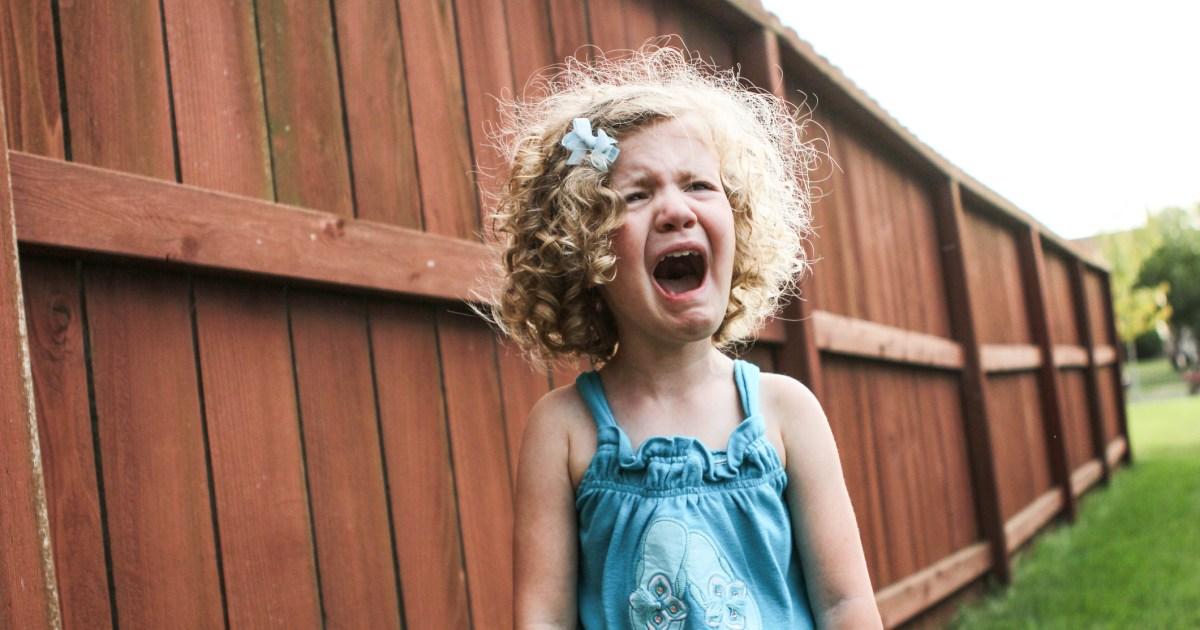
‘Your child was screaming yesterday.
‘She does scream a lot but this was far longer than normal. Was there a reason for this? I thought I should go to the police!’
My husband and I were sitting outside watching our daughter Ava play with the water in the birdbath when our neighbour approached us.
We were shocked and confused by what she said. The police?
‘She was screaming for over half an hour! It’s not normal!’, our neighbour persisted.
‘It was her birthday,’ we explained. ‘She was overexcited.’ We saw her face relax into understanding. We thanked her for her concern.
‘I am not accusing you of anything,’ she said, and she left.
My husband and I looked at each other, completely shocked.
Of course, as we explained, Ava had indeed been screaming. It was her third birthday and she was having a wobble after starting the day hyper and ending it exhausted.
It wasn’t a normal day for us – family had been visiting Ava and her routine was completely out, not least because she hadn’t been able to get to sleep the night before because she had been so excited.
And as the day came to a close, the yelling started.

‘No! No! Get away! Get away!’ She screamed at myself and her dad, my husband Jacques.
Shortly after, she cried in our arms, saying ‘kiss me!’ and demanding to know how many days it would be until her next birthday.
And that was why my neighbour intervened – even commenting that Ava screams fairly often.
It’s true, she does.
But, in my experience, so do all toddlers. They don’t have complete language skills so express themselves however they can.
And, while they don’t have the language, they have big emotions, which are scary for them. As parents we need to let them share those emotions while we soothe them and show them their feelings are safe. Shaming parents is just so unhelpful because toddler screams are entirely normal.
Ava is a vibrant person who has big feelings and she is not quiet about them. As a person who needed therapy to learn to express my feelings, I certainly don’t want to stifle hers.
My youngest daughter will squeal in protest, rage in frustration, clap, dance and laugh with gusto.

My little girl is naturally very expressive, and I want her to be spontaneous and to trust her feelings no matter how hard that can be in the moment. As a parent, I can’t control how she feels, I can only support her through her wide range of emotions.
I always reassure myself that Ava is never more distressed than an average child would be, but those comments from my neighbour left my husband and I wracked with self-doubt.
When Ava first started screaming in a public space, aged two, we were leaving a Cape Town beach.
I gently said, ‘Come out of the water baby, it’s getting cold. Please come out, it’s time to go home!’
Ava didn’t want to. Eventually Jacques picked her up so that we could leave with our friends, and then she screamed as though the world was ending.
We gathered quite an audience. I could understand it. Jacques tried to soothe her while she bellowed in his ear: ‘No! I don’t want to go!’
Some people shook their heads while others were sympathetic.
Most of my friends were understanding, and it was a relief to hear them say it.
‘Kids always sound as though something is seriously wrong,’ one of the group commented, while another added, ‘Sometimes I feel like I want to cry when children scream.’
It felt like validation.

One of our friends did remark that Ava was ‘very vocal’ and I couldn’t help but remember that his own daughter was fully grown up, and wondered if he simply didn’t recall her own loud phase.
But for the rest of us, who had young children, there was an acknowledgement that not only did our toddlers scream, but that it could be quite triggering for people around us.
There have been times when Ava has cried because she is just plain hungry, tired or overwhelmed, usually when we are out of home and her routine is also unsettled.
Trips to the shops can be overwhelming, and sometimes Ava might see something she would like but can’t have. We have amassed crowds when she has cried in the shops and sometimes people have made comments such as, ‘What is upsetting that child?’ or, ‘Somebody make that child keep quiet!’.
During times like these, I have felt self conscious and awkward. Obviously, I try and make the situation better for not only people in public, but Ava herself, whether by feeding or distracting her, or simply taking her away from a stressful scenario like a busy shop.
More from Platform
Platform is the home of Metro.co.uk’s first-person and opinion pieces, devoted to giving a platform to underheard and underrepresented voices in the media.
Find some of our best reads of the week below:
Sex columnist Almara Abgarian offers these handy tips to people who have no idea how to please a woman.
This is how to save thousands of pounds by making one small lifestyle change, according to Zara Canfield.
What do you do if your mum thinks she’s invited to your hen do, but you don’t actually want her there? Columnist Alison Rios McCrone has the answer.
Rape survivor Ellie Wilson recalls what it was like for jury members not to believe her – even though she’d recorded a confession on tape.
Of course, sometimes even the best intentions can’t prevent a full meltdown, like on Ava’s birthday, and in those moments all we can do is our best to calm the situation down.
My daughter might occasionally be volatile, but she is completely normal.
Sadly I’m not alone in being judged. A friend recently shared that members of a neighbourhood WhatsApp group she is part of had complained about her screaming toddler.
My friend posted, through her tears, ‘I am sorry, she is three, I am doing the best I can.’
And that’s something we all have to remember.
Life with a toddler can certainly get quite screechy and there are definitely moments when I feel like hiding under the bed as Ava kicks off.
So I understand that our neighbours or strangers might have issues, concerns, or annoyance. But parents can’t look after everyone’s emotions at once – they have to prioritise their child.
What I really need in dramatic moments, and what my partner gives me, is a hug and the recognition that when our children are struggling, we are too.
The kids are expressing themselves. They might need soothing words but they are essentially fine. Toddlers scream and one day they will grow out of it.
So rather than complaining, or speculating about what’s causing it, the next time you see a parent struggling with a screaming child, a sympathetic, ‘Ah, I have been there, it’s tough’ would really make their day.
Do you have a story you’d like to share? Get in touch by emailing [email protected].
Share your views in the comments below.
Source: Read Full Article



